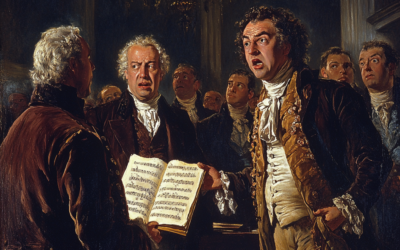Leopold Mozart
The Ambiguous Legacy of Leopold Mozart: A Man of Cunning and Adaptation
This post explores the multifaceted and often controversial life of Leopold Mozart, providing insight into the complexities and contradictions that defined his career and legacy.
Mozart in Italy: The Untold Story
Was Mozart truly a solitary genius, or was he merely the instrument of his father’s ambition? “Mozart in Italy” challenges the conventional narrative, revealing a complex dynamic between father and son that shaped the course of music history. Prepare to question everything you thought you knew.
“In a letter now astounding for its falsehoods, Leopold lied about his still-living father, claiming the old bookbinder had sent him to Salzburg for studies (avoiding mention of that academic disaster)”
Mozart in Italy
Leopold Mozart, often overshadowed by the brilliance of his son Wolfgang, led a life marked by ambition, cunning, and a series of compromises that both defined and limited his legacy. Despite his lifelong service under five archbishops and seven Kapellmeisters in Salzburg, Leopold never rose above the rank of deputy Kapellmeister. His musical training was largely self-taught, honed through practical experience rather than formal education, which limited his ascent in the highly competitive world of 18th-century music.
Leopold’s career was not without its share of scandals and setbacks. One of the most infamous incidents was his anonymous pamphlet that mocked a cathedral canon—a move that nearly destroyed his reputation. This public humiliation left him deeply scarred and fuelled a newfound cynicism. In a bid to restore his standing, Leopold crafted another anonymous work, this time targeting his fellow musicians in Salzburg. Posing as a newly arrived music lover, he cleverly promoted his own talents while subtly undermining his colleagues. This act of self-promotion, laced with fabrications about his expertise in counterpoint, philosophy, and law, was a testament to his resourcefulness, even if it came at the cost of honesty.
Leopold’s self-aggrandising efforts extended beyond pamphlets. His 1756 publication, “Violinschule,” is often regarded as his most significant contribution to music. Yet, even this work was not entirely original, heavily borrowing from the methods and teachings of other composers like Pietro Antonio Locatelli, Francesco Geminiani, and Giuseppe Tartini. Leopold presented these insights as his own, with little to no acknowledgment of the true sources. This act of appropriation reveals a man who, while not a virtuoso or a celebrated composer, knew how to adapt and repurpose the work of others to fit his ambitions.
Despite these efforts, Leopold struggled with professional frustration. His aspirations for greater recognition were frequently thwarted, and he found himself relegated to the modest court orchestra in Salzburg. To make ends meet, he supplemented his income by giving private lessons, copying scores, and selling compositions—some of which were likely cobbled together from the works of others and passed off as his own. His correspondence with his publisher, Lotter, paints a picture of a man constantly scrambling to maintain his reputation, often at the expense of integrity.
Leopold’s relationship with his family was equally complex. His manipulation of his mother for financial gain, his secret marriage to Anna Maria Pertl, and the subsequent estrangement from his family in Augsburg reflect a man who was willing to deceive those closest to him to achieve his goals. This rift was painfully evident when, years later, his grandchildren, Wolfgang and Nannerl, performed in Augsburg without their grandmother present in the audience.
In the end, Leopold Mozart’s life was a testament to survival in a world where his talents were often overshadowed by those of his more gifted contemporaries and his own son. While his “Violinschule” remains a notable contribution to music pedagogy, it is clear that Leopold’s legacy is as much about his ability to navigate the challenges of his time as it is about his musical achievements. His story is one of ambition, adaptation, and the lengths to which one man would go to secure his place in history, even if that place was built on borrowed foundations.
You May Also Like
When the Myth Collapsed
Vienna exposed the myth: La Finta semplice was riddled with errors, and Wolfgang’s supposed opera genius was nothing more than Leopold’s fabrication. With their reputation in ruins, father and son turned to Italy, hoping to rewrite history.
The London Notebook and the Vienna Disaster
Far from the myth of a flawless young genius, Mozart’s London Notebook reveals musical struggles and guided exercises, while the Vienna opera disaster proved that his father played a far greater role in his compositions than legend would have us believe.
Versailles, Vanity, and the Pursuit of Prestige
Leopold Mozart’s letters transformed his son’s European tour into a carefully staged fantasy—filled with exaggerated encounters, fabricated royal admiration, and a relentless pursuit of social prestige. But how much of it was real?
The Fabricated Childhood of Mozart
The legend of young Mozart’s divine genius crumbles under scrutiny, revealing a childhood dictated by Leopold’s ambition, carefully constructed myths, and a relentless pursuit of fame at the expense of genuine artistic education.
The Man Behind the Myth
Leopold Mozart’s legacy has been shaped by myths and hagiographies, but his letters reveal a man more concerned with financial gain and self-promotion than artistic integrity. Was he truly a devoted father, or simply an opportunist?
Constanze vs. The Catholic Church
For over two centuries, scholars have debated the circumstances surrounding Mozart’s burial. Constanze Mozart’s supposed inability to mark his grave, the confrontation with the Catholic Church over funeral masses, and the baffling disappearance of Mozart’s body all contribute to a mystery stranger than fiction. Did a powerful group keep her silent? And what really happened to Mozart’s remains?







